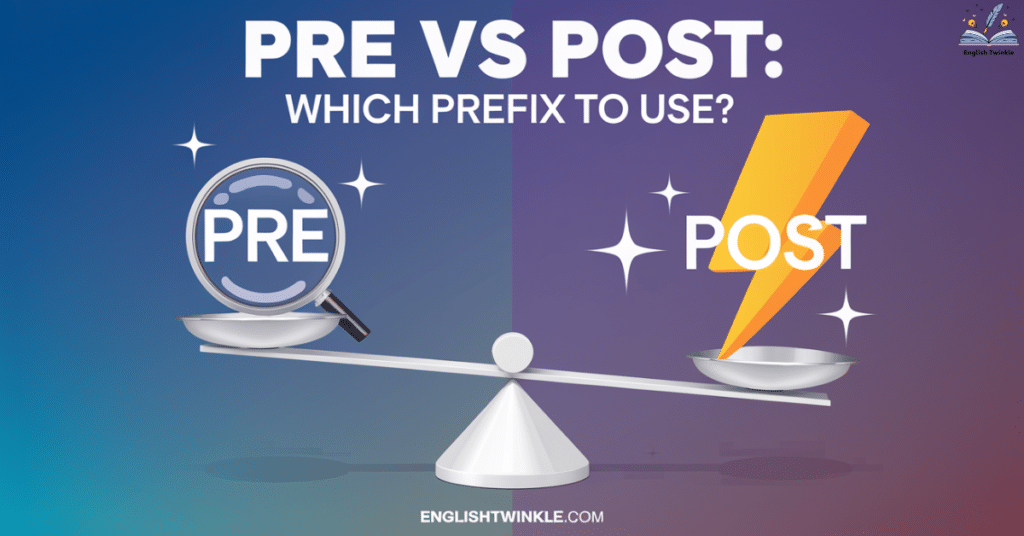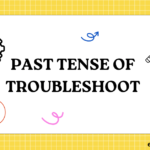In the vast landscape of language, tiny words often wield tremendous power. Among these linguistic dynamos, the prefixes “pre vs post” stand out as true titans. These tiny prefixes with big impact shape our understanding of time, events, and even our daily routines. But how well do we really understand their functions and differences? Let’s dive into the fascinating world of “pre” and “post” to unravel their mysteries and master their usage.
The Essence of Pre and Post: Understanding Pre and Post
At their core, “pre” and “post” are prefixes that help us navigate the timeline of events. Pre typically means “before” or “in advance of,” while post generally signifies “after” or “behind.” However, their roles extend far beyond these simple definitions.
These prefixes are linguistic chameleons, adapting to create new words and shape our perception of time and events. They’re not just grammar tools; they’re time machines in word form.
The Power of Prefixes
Prefixes like “pre” and “post” are language’s secret weapons. They can:
- Transform existing words
- Create entirely new concepts
- Provide temporal context
- Influence our understanding of processes and events
To truly grasp the functions of pre and post, let’s break them down individually.
Pre: Before It All Begins
The prefix “pre” comes from the Latin “prae,” meaning “before” or “in front of.” It’s the anticipator, the planner, the one that gets us ready for what’s to come.
Common Uses of “Pre”
- Preparation: Pre-heat, pre-plan, pre-arrange
- Time: Pre-dawn, pre-historic, pre-modern
- Position: Pre-frontal, pre-cursor, pre-fix
- Condition: Pre-existing, pre-disposed, pre-natal
The Nuances of “Pre”
While “pre” generally indicates “before,” its usage can sometimes imply more:
- Importance: Pre-eminent (standing out)
- Prevention: Pre-empt (act before someone else)
- Superiority: Pre-dominate (to be more powerful)
Pre- Examples in Context
| Word | Meaning | Example Sentence |
| Pre-order | To order in advance | “I pre-ordered the new smartphone to ensure I get it on launch day.” |
| Pre-nuptial | Before marriage | “The couple signed a pre-nuptial agreement to protect their assets.” |
| Pre-school | Before formal education | “My daughter attends pre-school to prepare for kindergarten.” |
| Pre-heat | To heat beforehand | “Don’t forget to pre-heat the oven before baking the cake.” |
| Pre-existing | Existing beforehand | “Her pre-existing condition made it difficult to get insurance.” |
Post: After the Dust Settles
Derived from the Latin “post” meaning “after” or “behind,” this prefix helps us understand what happens in the aftermath.
Frequent Applications of “Post”
- Time: Post-war, post-graduate, post-modern
- Position: Post-script, post-nasal, post-operative
- Change: Post-transformation, post-transition
- Continuation: Post-production, post-processing
Surprising Uses of “Post”
“Post” isn’t always about time:
- Location: Post-orbital (behind the eye)
- Delivery: Post-haste (with great speed)
- Continuation: Post-date (to put a later date on)
Post- Examples in Context
| Word | Meaning | Example Sentence |
| Post-game | After a game | “The team had a post-game discussion to analyze their performance.” |
| Post-apocalyptic | After a catastrophic event | “The movie depicts a post-apocalyptic world where resources are scarce.” |
| Post-graduate | After obtaining a degree | “She pursued post-graduate studies to specialize in her field.” |
| Post-mortem | After death | “The detective conducted a post-mortem examination to determine the cause of death.” |
| Post-production | After filming | “The movie is in post-production, where special effects are being added.” |
Pre vs Post: The Showdown

Understanding the pre and post differences is crucial for effective communication. Let’s break it down:
| Aspect | Pre | Post |
| Timeline | Before an event | After an event |
| Function | Preparation, anticipation | Reflection, consequence |
| Context | Sets the stage | Analyzes outcomes |
| Examples | Pre-game warmup, pre-nuptial agreement | Post-game analysis, post-mortem examination |
Bonus Fun Fact:
Despite their opposite meanings, “pre” and “post” are distant cousins! They both trace their roots to the ancient Proto-Indo-European root “*per-” meaning “forward” or “beyond.” Isn’t it fascinating how these prefixes evolved from a common ancestor?
Exceptions to the Rule
Language is full of surprises, and “pre” and “post” are no exception:
- Postdate: Can mean to put a future date on something
- Precede: Comes before, but sounds like it might come after
- Postpone: Means to put off to a later time, not after
The Gray Area: When Pre and Post Overlap
Sometimes, the line between “pre” and “post” blurs, creating interesting linguistic phenomena.
Interchangeability
In some contexts, “pre” and “post” can be interchangeable:
- Pre-war vs Post-war: Both refer to the same period, just from different perspectives
- Pre-modern vs Post-classical: Often describe overlapping historical periods
Context is King
The meaning of “pre” and “post” can shift dramatically based on context:
“The pre-dinner drinks were actually served post-dinner due to a scheduling mix-up.”
In this sentence, the temporal meaning of “pre” is overridden by its function in the compound word “pre-dinner,” while “post” maintains its temporal significance.
Beyond Time: Other Dimensions of Pre and Post
While primarily associated with time, “pre” and “post” have other fascinating applications:
Spatial Uses
- Preposition: A word placed before a noun
- Postposition: A word or particle placed after a word (common in languages like Japanese)
Hierarchical Applications
- Prefect: A person placed in charge
- Postmaster: The head of a post office
Metaphorical Extensions
- Prerequisite: Something required beforehand (not necessarily time-related)
- Postulate: To suggest or assume the existence of something
Pre and Post in Different Fields

The usage of pre- and post- extends across various disciplines, each with its unique applications:
Medical Terminology
| Pre- Term | Meaning | Post- Term | Meaning |
| Prenatal | Before birth | Postnatal | After birth |
| Preoperative | Before surgery | Postoperative | After surgery |
| Prediabetic | Before diabetes onset | Post-traumatic | After a traumatic event |
Academic Jargon
| Pre- Term | Meaning | Post- Term | Meaning |
| Pretest | Exam before instruction | Posttest | Exam after instruction |
| Prerequisite | Required beforehand | Postdoctoral | After receiving a doctorate |
| Preliminary | Initial or preparatory | Postscript | Written addition after the main body |
Technology and Social Media
- Pre-launch: Before a product is released
- Post-processing: Manipulating data after initial processing
- Pre-alpha: Very early stage of software development
- Post-install: Actions taken after software installation
Legal and Business Contexts
- Pre-trial: Before a court case begins
- Post-merger: After two companies combine
- Pre-contract: Before a formal agreement is made
- Post-acquisition: After one company acquires another
The Art of Choosing: Pre or Post?

Selecting between “pre” and “post” isn’t always straightforward. Here are some tips to guide you:
- Consider the timeline: Is the event in question before or after a key moment?
- Examine the function: Are you preparing or reflecting?
- Check the context: How does the word fit into the broader sentence or paragraph?
- Consult a dictionary: When in doubt, look it up!
Common Pitfalls to Avoid
- Don’t use “pre-” when you mean “re-” (e.g., “pre-do” instead of “redo”)
- Avoid redundancy (e.g., “pre-plan” when “plan” suffices)
- Be careful with hyphenation (e.g., “postwar” vs “post-war”)
Pre and Post Around the World
The concepts of “pre” and “post” aren’t unique to English. Many languages have similar prefixes or constructions:
| Language | “Pre” Equivalent | “Post” Equivalent | Example |
| French | pré- | post- | prénatal (prenatal), postmoderne (postmodern) |
| Spanish | pre- | pos- | preescolar (preschool), posguerra (postwar) |
| German | vor- | nach- | Vorgeschichte (prehistory), Nachkriegszeit (postwar period) |
| Italian | pre- | post- | preistorico (prehistoric), postmoderno (postmodern) |
Cultural Differences
The interpretation of “pre” and “post” can vary culturally:
- In some cultures, “post-dinner” might refer to dessert, while in others, it could mean after-dinner drinks
- The concept of “pre-history” can differ based on when a culture considers its recorded history to begin
The Future of Pre and Post
As language evolves, so too does the usage of “pre” and “post”:
Emerging Trends
- Increased use in technology (e.g., “pre-loaded software”, “post-quantum cryptography”)
- New compound words in social media (e.g., “pre-gaming”, “post-truth”)
Potential New Applications
- In artificial intelligence: “pre-training” and “post-processing” of neural networks
- In climate science: “pre-anthropocene” and “post-carbon” eras
Mastering Pre and Post: Practical Exercises
To truly understand the functions of pre and post, practice is key. Try these exercises:
- Fill in the blank: “The ___-match analysis revealed why the team lost.”
- Transform this sentence using “post-“: “Before the hurricane, we didn’t appreciate solid roofs.”
- Real-world scenario: Describe your morning routine using “pre-” and “post-” prefixes.
Exercise Answers and Explanations
- “The post-match analysis revealed why the team lost.”
- This uses “post” because the analysis occurs after the match.
- “Post-hurricane, we truly appreciated the value of solid roofs.”
- Here, “post” indicates the change in perspective that occurred after experiencing the hurricane.
- Sample morning routine:
- Pre-alarm: Sleep peacefully
- Post-alarm: Stretch and yawn
- Pre-shower: Gather clothes
- Post-shower: Get dressed
- Pre-breakfast: Check emails
- Post-breakfast: Brush teeth and leave for work
Conclusion: Embracing the Power of Prefixes
“Pre” and “post” may be small, but their impact on language is monumental. These tiny prefixes with big impact help us navigate time, processes, and events with precision and clarity.
By understanding the nuances of pre vs post, we can communicate more effectively and appreciate the subtle complexities of language. Whether you’re a writer, a student, or simply a language enthusiast, mastering these prefixes will enhance your linguistic toolkit.
Remember, language is a living entity, constantly evolving. The way we use “pre” and “post” today might shift in the future. Stay curious, keep learning, and never underestimate the power of two little letters to change the entire meaning of a word.
Further Resources
To deepen your understanding of prefixes and etymology:
- Books: “Word Power Made Easy” by Norman Lewis
- Online Tools: Etymonline for exploring word origins
- Podcasts: “The History of English Podcast” for linguistic deep dives
By embracing the intricacies of “pre vs post,” you’re not just learning grammar; you’re unlocking a new way to perceive and describe the world around you. So go forth and prefix with confidence!

Freck John, linguist and English educator, shares grammar insights and writing tips at English Twinkle, making language concepts accessible to all learners.







